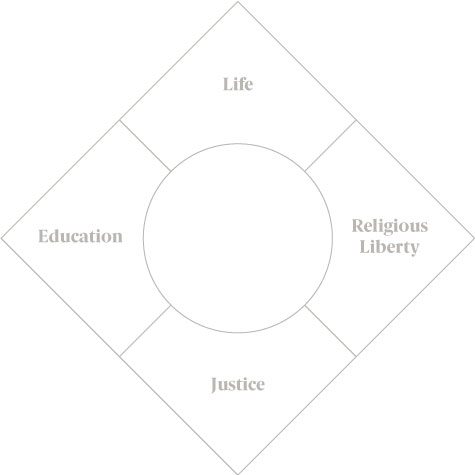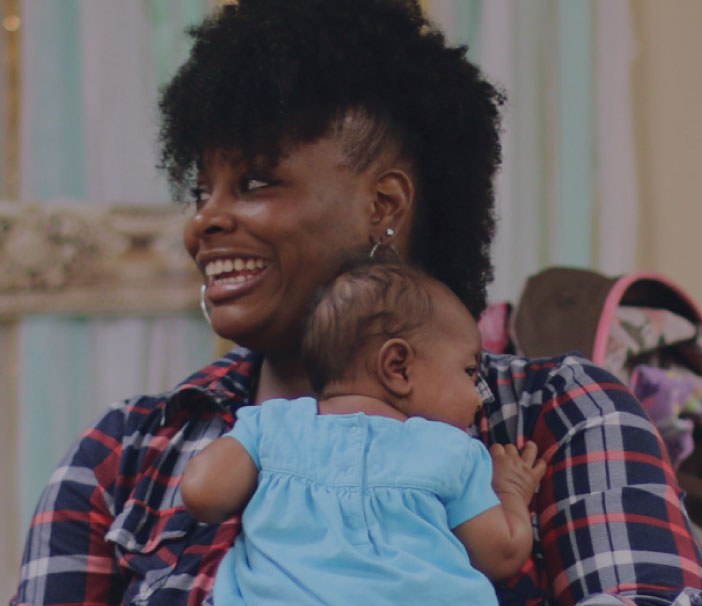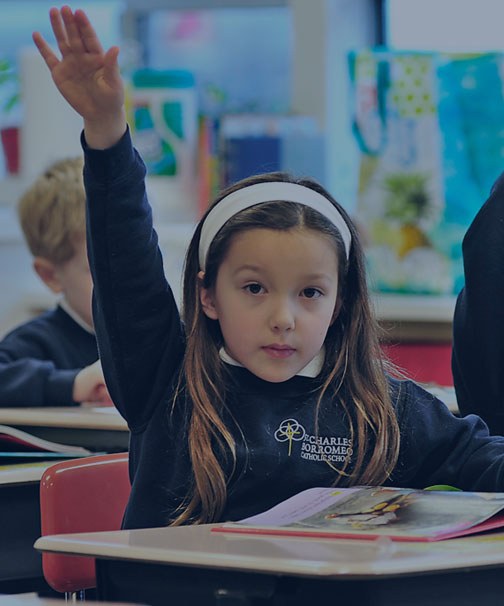Issues
Giving a Voice to the Voiceless.
Putting our faith into action through advocacy, we seek to protect the dignity of every human person.

Issues
Belief in the inherent dignity of each human life from the moment of conception until natural death is the most fundamental principle of our moral teaching as Catholics. This same principle also drives our care for the most vulnerable in our communities, our respect for and protection of religious freedom, and our focus on the basic human right of education to realize our full human potential.


Each human life is a gift from God. Every person has inherent and inalienable dignity because we are made in God's image and likeness.
Abortion
The most fundamental right is the right to life. Without life, no other human rights need to exist.
The right to life begins at conception and remains inviolable until natural death. Concurrent with a right to life is a right to a life of dignity. In Catholic teaching, dignity requires that every person have access to the necessities of housing, healthy food, clean water, employment, education and health care.
The WSCC encourages advocacy for public policies that respect and protect all human life, including efforts to end abortion, and is in favor of measures that help pregnant women and families meet their needs and raise healthy children. The WSCC also supports pro-life pregnancy resource centers that assist women and families that are making difficult decisions about unplanned pregnancies.
Catholic parishes support families who choose life through the Pregnancy and Parenting Support (PREPARES) program. This program is designed to help mothers, fathers, and families through their child's fifth birthday. Learn more about this ministry, starting a program at your parish, or seeking PREPARES support by visiting the PREPARES website.
Be sure to join our network to receive our Catholic Advocacy Bulletin and receive the latest updates on respect life advocacy. During the state legislative sessions we provide weekly updates on actions you can take to advocate for life.
Human Trafficking
“Human trafficking is an open wound on the body of contemporary society, a scourge upon the body of Christ. It is a crime against humanity.” – Pope Francis, “Address to Participants in the International Conference on Combating Human Trafficking (April 10, 2014). Buying and selling human beings into forced labor or commercial sexual activity is one of the most lucrative criminal enterprises in the world. Trafficking is a grave violation of human dignity. Both labor and sex trafficking occur in every nation, including the United States, and Washington state is not immune from these crimes.
The WSCC supports efforts to eliminate human trafficking and restore its victims to lives of dignity, stability and safety.
Physician-Assisted Suicide
Legalized in 2009 by a vote of the people, Washington State’s physician-assisted suicide law permits people who have been diagnosed with a terminal illness to request a lethal dose of medication from a physician. Even though reporting is required under the assisted suicide law, it is impossible to know the actual number of deaths from assisted suicide because there is no government oversight or investigation. Data from other states and countries with assisted suicide laws show that most individuals choose this option out of fear of loss of autonomy or burdening family rather than severe pain. The Legislature continues to seek opportunities to expand assisted suicide, perpetuating the ideology of suicide as preferable to illness or disability.
Based on Catholic teaching and concern for human life and the common good, the WSCC strongly opposes assisted suicide, noting also that it is dangerous public policy. It places vulnerable people at risk for abuse as the law provides inadequate safeguards and fosters a sense of suicide as an acceptable solution to mental health issues such as fear.
Ethical Research
One way that Catholics can promote our value of respecting life is by advocating for ethical research. For example some medical and pharmaceutical researchers use cell lines originally derived from an abortion. However, alternatives to abortion-tainted cell lines do exist and can be employed. The USCCB encourages the faithful to use these sample letters and write pharmaceutical companies that use abortion-derived cell lines. Urge them to use other cell sources in their work. Learn more about promoting ethical research from the USCCB website.


The concept of justice in Catholic social teaching is at the core of the commandment to love our neighbor as our self.
Luke 10:25-37
Poverty
People experiencing poverty lack the resources essential for a life befitting human dignity. St. John Paul II spoke of the universal destination of goods – God created the earth and its resources and intended them to be shared equitably among the entire human family.
Homelessness is one of the more visible signs of increasing poverty in Washington state. But individuals may be housed and still lack adequate food, access to preventative health care services, or live from paycheck to paycheck. Washington’s higher minimum wage helps, but its higher housing costs also price many out of safe and stable living situations.
The WSCC supports bringing true economic justice to the citizens of our state.
Care for God's Creation
The beauty of nature surrounding us in the Pacific Northwest provides us with inspiration and is a sure sign of God’s love. Yet while our corner of the world holds much beauty, we know not all is right with our planet. As a faith that believes we are all brothers and sisters, we also recognize that policy decisions at every level in the United States have global impact, with much of the harm borne by countries without the resources to adapt to a rapidly changing climate.
Here in Washington, the state’s Catholic bishops have regularly worked to boost care for creation in our own backyard, including the development of the groundbreaking 2001 pastoral letter “The Columbia River Watershed: Caring for Creation and the Common Good.” This important document stated, “the common good demands a proper respect for the land, the air and the water to assure that when we have passed through this land it remains habitable and productive for those who come after us.”
Restorative Justice
Washington State has made strides to provide alternatives to incarceration for nonviolent offenders. However, Native Americans are incarcerated at a rate more than six times that of whites. Black individuals are incarcerated at a rate almost six times higher than whites in our state. The state is also home to a for-profit detention center, a business model based in treating human beings as mere commodities.
A Catholic approach to criminal and restorative justice recognizes that the dignity of the human person applies to both victims of crime and those who have committed harm. Justice includes more than punishment. It must include mercy and restoration. The Catholic Bishops in this state believe that for restorative justice to be effective, it must address the systemic and structural barriers to healing such as racial and economic disparity, cycles of crime and incarceration, and the breakdown of the family.
Immigration
“Every migrant is a human person who, as such, possesses fundamental, inalienable rights that must be respected by everyone and in every circumstance.” (Pope Benedict XVI, Charity in Truth, no. 62) The U.S. Bishops have declared that America’s immigration system is broken and in need of comprehensive reform.
The first comprehensive immigration policy on which our current immigration system is based was the Immigration Restriction Act of 1924. Proposed by Senator Albert Johnson from Washington state, the law represented a strong anti-immigrant stance which remains in full force and effect today. Immigrants, however they may enter the country, bear the full breadth and depth of human dignity as any other resident of this nation. The WSCC supports state and federal legislative efforts that help ensure the dignity of immigrants and provide pathways to citizenship, especially for those brought to this country as children or who have lived and worked in the shadows for decades.
To learn more about how the Catholic Church in the state of Washington is supporting immigrants, click here.


“[N]o one can demand that religion should be relegated to the inner sanctum of personal life, without influence on societal and national life, without concern for the soundness of civil institutions, without a right to offer an opinion on events affecting society. Who would claim to lock up in a church and silence the message of Saint Francis of Assisi or Blessed Teresa of Calcutta?”
Pope Francis, Joy of the Gospel (no. 183)
The freedom of religion is enshrined in Catholic social teaching, the U.S. Constitution, and the U.N. Universal Declaration of Human Rights. A person’s faith is closely bound to her/his individual conscience, and both warrant respect and protection.
Religious Freedom
“Religious liberty is not only about our ability to go to Mass on Sunday or pray the Rosary at home. It is about whether we can make our contribution to the common good of all Americans.”
Our First, Most Cherished Liberty, USCCB, 2012
“The human person has a right to religious freedom. This freedom means that all people are to be immune from coercion on the part of individuals or of social groups and of any human power, in such wise that in matters religious no one is to be forced to act in a manner contrary to her or his own beliefs … whether privately or publicly, whether alone or in association with others, within due limits.”
Second Vatican Council, Declaration on Religious Liberty (Dignitatis Humanae), no. 2.
The WSCC is working to defend religious freedom in Washington State and educate Catholics about the multiple ways it is threatened.
Conscience Protection
“Conscience is the most secret core and sanctuary of a person. There the person is alone with God whose voice echoes in his or her depths.”
Second Vatican Council, Gaudium et Spes, no. 16
It is for this reason that the Church vigorously protects the right of conscience in matters ranging from medical professionals not being forced to assist with abortions to soldiers not being compelled to fight in war.
The WSCC endeavors to identify opportunities to strengthen the protection of conscience.
Learn more about religious liberty from the US Conference of Catholic Bishops. You can also subscribe to the First Freedom Monthly Newsletter and listen to the First Freedom Podcast.
The need for religious freedom intersects numerous policy issues.
Some examples:
Health Care
Catholic health care institutions must be able to serve those in need while adhering to the Ethical and Religious Directives for Catholic Health Care Services. Additionally, the conscience rights of all health care professionals must be preserved at their place of work.
Care for Our Immigrant Brothers and Sisters
Freedom of the Church means that the Church cannot be impeded by the civil authorities from engaging in her mission. That mission includes ministry to those fleeing violence and poverty.
Religious Freedom Abroad
We must pray for Christians throughout the world who are restricted from fully practicing their faith and support federal aid programs that ensure faith-based groups are able to minister to people in need around the globe.


The Church considers education a basic human right because without it, it is impossible for a person to realize their full human potential, the purpose for which they were given life by God. Catholics recognize and support the right of parents to be the primary educators of children.
The WSCC represents the state’s 100 Catholic schools on matters of public policy. These important K-12 academic institutions deliver excellence in education to 27,000 students of all different economic backgrounds and, in the course of doing so, save the State of Washington over $300 million per year.
Access / School Choice
The WSCC supports full and fair parental choice in education supported by tax relief, scholarships, educational savings plans and other aid to parents so they may seek the educational opportunities best suited for their children.
School Safety
Children should feel and be safe when they are at school. The WSCC supports legislative efforts to ensure student safety, along with funding to assist all schools with meeting appropriate health and safety standards. We believe students should feel welcomed in their schools and have opportunities to choose school environments where they feel supported and successful.
Early Childhood Education
In line with the U.S. Bishops, the WSCC supports universal Pre-K initiatives that assist parents to choose among public, private and religious pre-schools. We also work to ensure that all students and their teachers, regardless of where they attend and teach school, share government benefits and services equitably.

For more information on the Catholic Church’s stance on national public policy issues, visit the United States Conference of Catholic Bishops website.